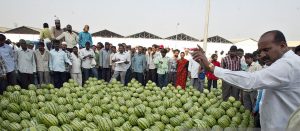Clockwork – What GOI’s NAM (National Agriculture Market) can learn from Dutch Clock Auction Houses of 90s.
 Recognizing that efficient terminal horticulture markets would stimulate productivity, raise quality standards, reduce losses and ensure consumer access to an increasing supply of fresh horticultural produce at reasonable prices, in 1998, the Department of Agriculture and Co-operation, Ministry of Agriculture, Government of India, requested the National Dairy Development Board (NDDB) to study and formulate a detailed implementable project for fruit and vegetable marketing.
Recognizing that efficient terminal horticulture markets would stimulate productivity, raise quality standards, reduce losses and ensure consumer access to an increasing supply of fresh horticultural produce at reasonable prices, in 1998, the Department of Agriculture and Co-operation, Ministry of Agriculture, Government of India, requested the National Dairy Development Board (NDDB) to study and formulate a detailed implementable project for fruit and vegetable marketing.
Same year, a three member team from NDDB (me, a supply chain expert), were invited by Royal Cebeco Group Co-operative of the Netherlands, our partners in the project, to make a quick scan on this project. Cebeco wanted us to know if we were on the right track with the Project and to have a second opinion about the decisions already made.
Besides flower auction in Aalsmeer, near Amsterdam, we also visited ZON Verkoopdiensten BV, in Venlo, the Netherlands which was a fruit and vegetables auction founded in 1915 and was having a yearly turn over of 225 million Euro a year at that time. Apart from running a through academic study on the business processes and systems, I kept on recording my subjective observations on what is that that makes Dutch Clock Auctions tick. Today while looking for something else in my archives I chanced upon that note. Here’s the unedited version of my findings which I firmly believe would be still relevant if NAM has to succeed.
The principal function of an auction is to establish a price for the product. The Dutch Auction Clocks perform this function in a very subtle way by bringing buyers / sellers together at a place. The Auction houses provide best possible price to the growers and buyers. They also ensure timely supply of purchased produce to the buyers. The key factors that have made the horticultural trade in the Netherlands and the Dutch Auction Clock systems in particular, effective are:
COMMITMENT
- Commitment of producers to pour and pool their entire produces for common marketing through the auction systems.
- Commitment of buyers to purchase pooled produce of different producers.
- Commitment of producers and to pay a small percentage of their proceeds for a common cause.
TRUST
- For best possible prices and guaranteed payments, producers have trust in the system.
- For getting standardized produce even when many producers pool the produce, buyers trust the system.
FLEXIBILITY
- In spite of being a successful auctioning system, in a current scenario of supermarket monopoly requiring large quantities of consistent quality, emergence of key big buyers, liberalized imports, new political formations like European union and recent advances in infotech and electronic trade, the auction clocks are disappearing. They are either amalgamating into thicker organizations. Or in some cases the clocks have actually become obsolete and redundant For example: The number of Auction centers currently has come down to only 3 from 114 in late 70s’.
- Transparency, which was the hallmark of earlier system, is no longer desirable as there is cut throat competition between buyers to supply large quantities to a few major buyers. The growers are also getting benefited, as prices are not forced downwards.
- The cooperatives are encouraging small groups to work with the exporters / wholesalers to specialize in niche markets and have a system of negotiated prices and profit sharing between traders and small grower associations. However all such dealings are done through the Cooperatives system so that it retains its principal position. Producers continues to pay 4-5% commission to the Cooperative on his turnover and continues to receive a pooled produce price but is assured of his payments and cooperative’s support in case of any payment defaults.
SPECIALISATION
- The grower only produces and leaves the selling to the Auctions. Integration of wholesalers and exporters for trading is core competence of the Auction
- Retailing is best done by the retailers who are regarded as the cheapest employees for growers as they work around the clock as private entrepreneurs to earn their living and bear the risks and costs involved in retailing.
- There is no attempt to integrate all the marketing functions as each marketing unit uses the strengths of different functionaries and focus on its core competence.
- By virtue of being a specialized marketing requirements, fruits / vegetables / banana / potato / onion or for that matter processed produce, are traded differently by separate organizations.
- Specialists are handling logistics (transport and packaging systems etc.).
HISTORY
- The real growth of auction clocks occurred when a law regulated all members to sell through auctions in the post 2nd world war scenario.
- Growth in all round exports due to formation of the European Union boosted the growth of Auction Centers.
- The Board members of the Cooperatives were also historically the Board members for RABO bank (the cooperative bank) so they supported growers and the Auctions financially.
- The stories and myths around Clock Auctions have almost become part of the Dutch folklore. These stories are sustaining the popularity of clocks within and outside the country.
- There is even a DOS game available on clock auctions since long for fun and training.
CONCENTARATION
- Concentration of demand and supply. Auctions are successful in setting prices because demand (traders) and supply (producers) is concentrated (meet in one place). This requires that the arrivals and auction timings are synchronized and fixed for a particular commodity not only for an Auction but for all the auctions spread over the country.
- Similarly various suppliers (small, big, specialists, fruit ripeners and vegetable processors (salad shredders etc.) are all located at one place. (For example: wholesale market at the Hague or fruit terminal at Rotterdam)
STANDARDISATION
- The standards for produce as well as packing have evolved as per the market requirements and are ensured to the point that the buyers now usually bids without physically inspecting the produce.
- The system is able to guarantee the quality due to strict quality control. There is a third party involved to settle quality disputes. However, it is rarely used due to the fact that the sellers value their reputation greatly.
COOPERATIVE SPIRIT
- The spirit to cooperate and pool resources for a common goal is very much evident everywhere in the Netherlands. It is very much obvious in the clock auctions, canal systems and wind mills etc.
- Ownership of a cooperative is an investment for most of the farmers. They contribute part of their turnover each year (1 %) and get it back after 8 years with an interest (4%).
PARTICIPATION
- The members are obliged to market his entire output. Members between themselves strictly monitor this. This peer pressure put in built controls and monitoring in the system
- Auction Houses were owned and managed by the Growers. Auction centers are all cooperatives.
CREDIT MANAGEMENT
- Credit is very much a part of the system. Soft loans are provided to the Growers at interest rates as low as 4% by banks (low interests due to low inflation) mainly the RABO Bank. Auctions provide credit to buyers.
- It is the credit management that helps protect the growers’ interest. Credit limits of buyers are critically reviewed. Bank guarantees are provided by all. Wholesalers and retailers have sufficient assets to mortgage.
OPERATIONAL EFFICIENCY
- Efficient handling requires control on flow of products at various levels. For this reason, quality requirements, size of transactions, loading ratios, packaging are critically studied. Thus sample auctions or blind buying have evolved.
- Operating systems like ‘Tracking and Tracing’ offers location information on lots from point of entry to moment of delivery.
COMMUNICATION
- Communication strategy is to select small study groups (7 key people per group) that identify the problems for the group, solve them and inform others.
- These small groups also identify and communicate new ideas for a common cause and advocate acceptance.
- They take small steps with small groups rather than have a meeting of all members and announce decisions
INNOVATION
- From moving hands of the clocks by the hand to electronic bidding from the buyers offices in a small time frame is a perfect example of constant innovation
PROXIMITY
- Auction Houses were based in production belts and the growers were able to witness at close quarters the transparency in the system and also supervise the operations handled by professional management. This has resulted in absolute trust in the system and a very high degree of involvement of growers.
- In order to best identify with the system and players, most of the auction functionaries were consciously selected from the hinterlands.
TRANSPARENCY
- Information regarding arrivals is known to all, as well as the demand, thus resulting in complete transparency and market responsive pricing.
PROFFESIONAL MANAGEMENT
- The Auctions were managed by growers themselves till the 70’s after that due to market pressures a need to induct professional management in the system was felt by growers.
- Great care was taken to ensure that the professionals had roots among the growers and their interests in heart.
- The Board is extremely business oriented (cost and profit conscious) and the professional management is totally accountable to the Board for the profitability.
SAFETY OF GROWERS’ PAYMENT.
- When a grower supplies his produce to auction he is assured of best price and his payments
- In time of gluts, Product funds are created from revenues for a minimum price guarantee to growers.
- Even if a grower trade outside the system, as long as he pays service charges to auctions, his payments are almost guaranteed.
Stay tuned for more on what is needed to revamp wholesale F&V Markets in and for India.




